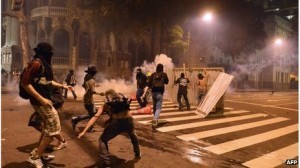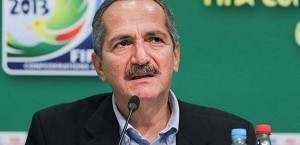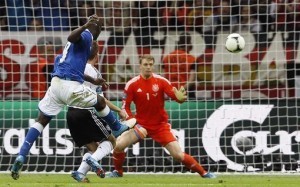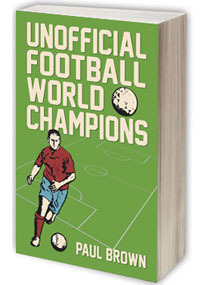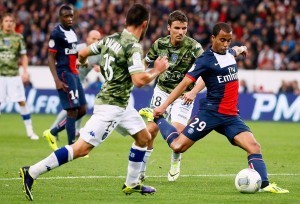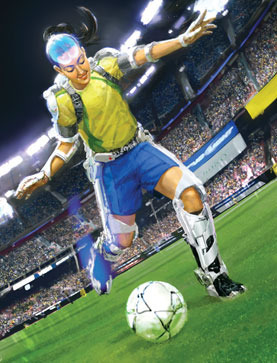Laurent Dubois's Blog, page 92
October 29, 2013
Les Manifestations Continuent
Un article a été publié dans le Wall Street Journal la semaine dernière qui décrit récentes manifestations à Sao Paulo et Rio de Janeiro. Même si les manifestations massives qui ont eu lieu à travers le pays cet été ont pour la plupart disparu, de petits groupes continuent à protester dans les rues. La semaine dernière, les manifestants ont continué leur vandalisme et leurs affrontements avec la police. À Sao Paolo, ils ont cassé des fenêtres et ont envahi les magasins, des gens ont même jeté des objets aux policiers. À Rio, la police s’est défendue avec des gaz lacrymogènes. Pour se venger les manifestants ont brûlé une voiture de police.
Tout cela destruction montre comment les policiers ont des difficultés à contrôler ces foules violentes et la frustration que les Brésiliens ont encore même après les manifestations géantes en Juin quand des millions de Brésiliens ont protesté contre la corruption, les services publics pauvres et l’augmentation du coût de la vie. Il n’est pas surprenant que beaucoup de Brésiliens sont extrêmement bouleversé et en colère contre la façon dont le gouvernement dépense l’argent pour promouvoir et construire tout ce qui est nécessaire pour la Coupe du Monde. Ils aimeraient voir l’argent aller vers le système public de soins de santé, l’éducation publique et des transports publics. Les prix des aliments et de la transportation continuent d’augmenter et les gens pauvres ne peuvent pas payer pour les nécessités.
Le ministre des Sports du Brésil, Aldo Rebelo, a aussi commenté sure les manifestations par rapport la Coupe du Monde l’année prochaine. Il croit que les manifestations vont se calmer pendant les jeux parce que les Brésiliens seront plus intéressés avec des célébrations qu’ils ne vont pas se plaindre de son coût. «Je pense que la Coupe du monde sera protégé par la volonté des gens à être en faveur d’un grand événement. L’ambiance sera pour les fêtes, non pas pour protester, quand les équipes nationales et les touristes commencent à arriver au Brésil.»
Secrétaire Général de la FIFA Jérôme Valcke a dit qu’il était satisfait avec la réponse de la police au cours de quelques-unes des manifestations qui ont affecté les six Confédérations de la FIFA villes hôtes; aucun des matchs ont été perturbés et il s’attend à le même type de réponse si les manifestations se produisent encore l’année prochaine. Il ne s’attend pas à ces manifestations pour arriver à la Coupe du Monde parce que Brésil aura le plus haut niveau de sécurité. Rebelo a déclaré que la police peut contrôler les petits groupes. Mais cela a été prouvé faux pendant de nombreuses occasions.
Le ministre, qui est le représentant du gouvernement en charge de la préparation du Brésil pour la Coupe du Monde et les Jeux Olympiques a Rio, a minimisé la menace récente par le plus grand groupe du crime organisé du pays qui a promis de lancer la Coupe du Monde de” la terreur” l’année prochaine, avec des attaques contre la police similaires à celles qui ont répandu la peur dans tout le pays en 2006. Rebelo a expliqué qu’ils ne prendront pas la menace légèrement, mais que c’est une menace de plus contre la police, non pas contre le public.
Je ne sais pas si ces gens croient effectivement que les affrontements se calmera à Rio. D’après mon expérience, il y a des protestations constamment et Rio depuis est dangereux. Par conséquent, je ne suis pas tellement convaincu que tout va se calmer quand la Coupe du Monde arrive, mais ce serait génial de voir un peu de paix.
Thierry Henry Flipbook
Je voudrais partager cette vidéo très cool de Thierry Henry que j’ai trouvé il y a quelques jours, après avoir parlé de lui aujourd’hui en classe. Faites-vous plaisir!
The Racialisation of Football in Italy
The conversation in today’s class has spurned me to look into the racialization and politization of football in Italy. Both Italy and France share many similarities in that, football creates a huge platform for media attention. Football players in European countries often receive more media attention than politicians and for that reason they are often a representation of there countries. Like France, Italy is in an awkward position politically as there seems to be a power vacuum that has allowed a strong nationalistic right wing party to emerge. In Italy this is the Lega Nord.
The Lega Nord, is a political party that believes in clamping down on immigration by closing the Italian borders to Muslim immigrants and limiting the amount of African immigrants in Italy. Most recently, the leader of the party, Roberto Calidroli said ”I love animals, but when I see her, I can’t help but think of an orangutan” in reference to Cécile Kyenge, Italy’s minister of integration, at a recent festival organised by the Lega. Kyenge is black, was appointed to the Cabinet in April, and Calderoli added that “maybe Kyenge should be a minister in her own country [sic] … she is only encouraging illegal immigrants to dream of success”.
The article below demonstrates the recurring problem of racism in Italian football, it illustrates the racial history of Italy, where it began and how it has emerged into such a problem. But overall, it illustrates that the future of Italy revolves around figures such as Mario Balotelli and Cecile Kyenge. Balotelli with his exposure to the media could transform how the youth look at race in Italy, especially if he is to lead Italy far into the World Cup much like he did in Euro 2012.
Must Read: http://espn.go.com/espn/feature/story/_/id/9338962/when-beautiful-game-turns-ugly
October 28, 2013
Le Chaos de la vie des footballeurs professionnels
Certains supporteurs ne font pas attention au foot que toutes les quatre années, en prévision de la Coupe du monde. Particulièrement aux Etats-Unis, ce n’est pas rare de trouver un Américain qui apprécie le foot mais qui ne sait rien de ce qui se passe dans le monde de foot quand la Coupe du monde n’est pas en train de se dérouler. Ces supporters comprennent comment jouer le foot et ils connaissent le tableau de service des équipes nationales. Mais ils ne savent rien des clubs qui payent aux stars des salaires énormes et des rivalités régionales qui provoquent des émotions intenses. Un article récent publié dans le New York Times, « In European Soccer, World Cup Is One of Many Priorities », démontre que l’internationalisme du foot—la Coupe du monde—n’est qu’une seule face du foot.
Bien que certains supporters se focalisent uniquement sur le Mondial, c’est impossible pour les footballeurs de faire de même, malgré le fait que c’est l’événement le plus important dans le monde de foot. Les footballeurs ont plusieurs responsabilités à la fois—leur club, leur équipe nationale, leurs parrains et leur santé. Quand plusieurs tournois ont lieu dans une période courte, c’est difficile pour les joueurs de jongler toutes leurs priorités, particulièrement quand ils doivent jouer avec deux équipes à la fois. Ça c’est un sujet que Rob Hughes déborde dans son article dans le Times. « Is there is [sic] any other walk of life in which the principal protagonists are expected to be at peak performance in three such diverse tournaments in such a short time? » demande Hughes, qui fait référence au fait que Cristiano Ronaldo, le star de l’équipe portugaise et du club Réal Madrid, jouerait dans les matches préliminaires de la Coupe du monde, dans « el Clásico » (contre Barcelona), et dans le tournoi de la ligue des champions (contre Juventus). On dit que c’est impossible pour un homme de servir plus qu’un seul maître à la fois. Les footballeurs n’ont pas d’autre choix : « They play, they rest and recuperate, and if they are not injured they have to be ready to play again, in different circumstances, on different grounds, and perhaps with different teammates on their side », remarque Hughes. Bien que le Mondial domine des pensées de beaucoup de supporters, il ne permette pas aux footballeurs d’oublier leurs responsabilités diverses. La vie des footballeurs est chaotique, et il faut respecter ceux qui, en dépit du chaos, parviennent à performer chaque jour et sur n’importe quel terrain d’une manière impressionnante. Ces footballeurs défient la douleur, l’épuisement, et la pression de réussir. Ces footballeurs sont presque surhumains.
Uruguay: World Champions
The Uruguay national football team has undoubtedly had a rough year. After a promising start to qualifying for the next World Cup, a run of negative results put the team’s chances in jeopardy. Uruguay ultimately advanced to a two-game playoff against Jordan for a spot in Brazil in 2014. Their 5th place finish in CONMEBOL qualification derived from a paltry 2-1-5 away record, including a 4-1 loss to lowly Bolivia, and an additional 3 home draws to weaker opposition such as Paraguay and Venezuela. Finishing below a talented Colombia team and a young upstart Chile was somewhat disappointing, but losing the last automatic qualification spot to Ecuador was shocking after Uruguay finished in 4th place in the 2010 World Cup in South Africa.
Despite their unfortunate year, Uruguay recently received a small piece of good news. On the last day of qualification, Uruguay sealed their playoff with Jordan with a 3-2 victory over a weakened Argentina team that had already clinched their World Cup spot. With that victory, however, Uruguay also earned one of the greatest honors an international side can hope to achieve: the title of Unofficial Football World Champions.
The Unofficial Football World Championships are best described as football’s version of a title belt from wrestling or boxing: a champion holds the belt, someone challenges them to a fight, and if this challenger beats the holder, they get the belt. The competition was the brainchild of Paul Brown, who in 2003 defined the competition’s rules and outlined the lineage of the title. The name was inspired by the first loss England suffered after their 1966 World Cup finals victory, to Scotland, in which Scotland were jokingly proclaimed the “unofficial world champions”. The championship, however begun all the way back in 1873, when Scotland became the first champions after defeating England in the second international match of all time (the first was a draw between the two sides). Since then, the title has moved around the world according to whichever team could beat the current holder.
The title has no meaning in today’s world (hence “Unofficial”) and has only a virtual trophy to offer to the current holders. FIFA does not sanction the tournament, and there’s no other form of official backing either. But what the competition does have is a winding, complex history. One would expect the title to be constantly interchanged between the best teams in the world, but because the title can be transferred in friendlies, then almost all teams potentially have access to becoming champion. In fact, the title has traveled to all corners of the globe, from superpowers in Europe and South America to minnows in Asia and Africa.
Nothing epitomizes the journey of the UFWC title quite like its history from 2010-2012. The Netherlands came into the the 2010 World Cup as Unofficial World Champions, after the holders in 2002 and 2006 had not even qualified for the World Cups in those respective years. Netherlands almost became the official World Champions in conjunction with the UFWC title before relinquishing both in their overtime loss to Spain. The voyage of the UFWC over the next two years was absolutely stunning. The title was contested in a World Cup final, a match estimated to have been watched by 3 billion people worldwide, and won by possibly the greatest international team of all time. Two years later, however, it was possessed by the 124th-ranked national team in the world in North Korea. Argentina had beaten Spain in a friendly in 2011, and then Argentina had lost to Japan, and finally Japan lost to North Korea in 2012. Additionally, for the first time in the long history of the competition, Asian teams were able to hold the title for a significant amount of time. North Korea embarked on a successful run in the 2012 AFC Challenge Cup, and defended their title against challenges from unlikely teams such as Turkmenistan, Philippines, Tajikistan, Palestine, and India, before finally losing the title to Sweden.
The Uruguay national team is probably not thrilled with their performances this year, after almost failing to qualify for the World Cup, and claiming the UFWC title won’t provide much consolation. But what the UFWC does provide is an entertaining competition open to all the international teams in the world. The competition has traversed the globe for 140 years, with over 800 official matches played. The title itself has passed between over 40 different countries, from international giants such as Brazil, England, and Argentina, and minnows like Wales, Netherlands Antilles, Zimbabwe, North and South Korea, and even the United States for 13 days. Paul Brown has since written a book about the competition, and maintains a website tracking the holder’s upcoming title defenses as well as preserving the history of all UFWC matches. There’s even a ranking of all international sides, based on their all-time number of successful title defenses.
I advise anyone interested in reading more about the topic of this trivial, yet fascinating competition at their official website found here: http://www.ufwc.co.uk/
La situation continue : l’impôt qui peut “tuer” des équipes françaises
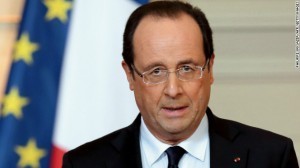
Comme une suite à ma poste précédente, je voudrais revoir la situation en France avec l’impôt de François Hollande. Jeudi dernier, les meilleures ligues de foot en France ont annoncé qu’ils ne participeront pas aux matchs de 29 Novembre à 1 Décembre en réponse à l’impôt de 75%. Jean-Pierre Louvel a dit que cette grève essaie de « sauver le foot français » et peut continuer si le président n’aide pas les clubs de foot français. Les ligues et François Hollande rencontreront cette semaine. Selon Jacques Vendroux, un commentateur sportif célèbre, les moyens clubs peuvent faire faillite avec les nouveaux impôts.
Les deux meilleures ligues en France, Ligue 1 et Ligue 2, ont perdu 149 million de dollars et elles perdraient un autre 60.7 million de dollars avec cet impôt. En France, il y a une croissance du sentiment contre des impôts. Étonnamment, le public ne soutient pas les joueurs du foot avec leur grève. Selon un sondage par LCI, 85% des personnes interrogées sont en faveur de taxer les joueurs et 83% des sondés ne croient pas qu’une grève est justifiée. Ces résultats me surprennent parce que j’ai pensé que l’amour du foot vaincrait François Hollande et son gouvernement. Cependant, j’ai oublié la histoire riche des joueurs français et des grèves. L’équipe nationale a perdu beaucoup de respect national et international quand il a fait la grève au Coup du Monde 2010. Le média compare cette situation plus récente à l’incident de 2010. Je trouve la réponse des français très intéressant mais si les équipes souffrent et ne jouent pas bien, je pense que les spectateurs et les citoyens changeront leurs avis.
UEFA President Calls for World Cup Expansion to Forty-Team Format
Responding to Fifa President Sepp Bladder’s recent call to expand the number of African and Asian berths to the World Cup at the expense of European and South American nations, UEFA President Michel Platini believes that the tournament should be expanded to a forty team format. This expansion to forty teams would allow for the number of African and Asian representatives in the tournament to increase without reducing the number of European and South American representatives.
Blatter believes that European and South American nations hold an unfair advantage in dominating the make-up of the tournament, despite the having fewer members associations of FIFA than other territories. Pushing towards globalization of the sport, Blatter would like to see the numbers of berths of a territory be more reflective of the number of FIFA member associations [1]. With only 63 member associations of FIFA, European and South American teams will account for 18 or 19 berths at the 2014 World Cup. Africa and Asia, on the other hand, will only be represented by 9 or 10 teams in total, despite accounting for 100 members associations of FIFA. Blatter believes that, “This flawed state of affairs must be rectified. At the end of the day an equal chance for all is the paramount imperative of elite sport.”
UEFA President Michel Platini, who many believe will be the successor to Bladder as FIFA President, feels that expansion of African and Asian berths should not come at the expense of European and South American nations. Instead, the tournament should be expanded to a forty-team format, with eight groups, each consisting of five teams [2]. He calculates that the length of the tournament would be expanded by only three days with this format. While this would add more berths for under-represented territories, this idea could significantly lower the quality of competition by adding berths to territories whose nations do not have teams of similar quality to that of Europe and South America.
As explained by the Nick Ackerman of Bleacher Report, “Although one of FIFA’s more commendable ideas, both Blatter and Platini have to consider the competitiveness of adding eight teams to the current setup.” With the last World Cup taking place in South Africa, only one of the six African teams in the competition was able to advance past the group stages [4]. This success rate is much lower than for the European (6 of 13) and South American (5 of 5) representatives. Additionally, with European and South American nations dominating the top 12 spots in the current FIFA rankings, it can be argued that these territories deserve the most representatives based on merit [5].
While I believe that Africa and Asia deserve more representatives in the World Cup, I do not agree that it should come at the expense of European and South American nations. I feel that this change could significantly lower the quality of competition in the tournament. I would be much more in favor of expansion, even if this resulted in the inclusion of lower quality teams in the tournament. I believe this format could result in qualification by nations who have fallen short of qualification due to the current format. With a more realistic opportunity for qualification, I believe that these nations will strive to produce a higher quality team that is able to compete on the World Stage. However, until the quality of teams in territories such as Africa and Asia matches those of Europe and South America, it is hard to argue for the number of berths per territory to better represent the proportion of member associations within FIFA.
References
[1] http://www.reuters.com/article/2013/1...
[2] http://uk.reuters.com/article/2013/10...
[3] http://bleacherreport.com/articles/18...
[4] http://www.fifa.com/worldcup/archive/...
October 27, 2013
Taking Technology to New Limits
We have been hearing all about goal line technology and how we may see other new technologies emerge, often showcased at the premier level that is the World Cup in 2014. However, in one of my most recent neuroscience classes, we discussed a Duke researcher, Miguel Nicolelis, who works in Brazil and seeks to have a different effect on the technology of the World Cup of 2014. Nicolelis is spearheading research in brain-machine interfaces, where machines will interpret action within the brain to produce that same function. Where we often see this applied is at the intersection of helping those who are paralyzed regain function and where many people see scientists building robots.
However, come 2014, Nicolelis hopes to have the first kick of the global tournament be from the foot of a paralyzed child, who will be using this robotic exoskeleton to essentially regain function in his legs and take the first kick. More about Nicolelis and this endeavor can be read here. Who knows, this could just be the first step on the way to a robotic team of players competing against a human team by 2050.
October 25, 2013
Diego Maradona Today
Our Diego, who is on the pitches,
Hallowed be thy left hand, bring us your magic. Make your goals remembered on earth as in heaven,
Give us some magic every day, forgive the English, as we have forgiven the Napolitan Mafia,
Don’t let yourself get caught offside and free us from Havelange and Pelé.
Diego
Despite being a parody of a prayer, to Argentinians Diego Maradona may as well be a deity. Unless Lionel Messi, or some future Argentinian starlet, can lead Argentina to a World Cup victory, then Maradona will stand alone as the undisputed greatest Argentinian soccer player of all time. Against England in ’86, he perhaps scored both the most famous and infamous goals of all time. The former involved a slashing, agile run starting within his own half, beating midfielders, defenders, and finally the goalkeeper to cap off a magical play that sent the crowd into an uproar. The other was just as exciting, but apart from the ball ending up in the back of the net, the two had nothing in common. A mistake by an English defender in his own penalty box lofted the ball over his own back line. Maradona, always ready to pounce, read the trajectory perfectly. Well, perfectly enough to cleverly disguise the use of his fist to propel the ball into the goal. In the wake of the Falkland Island dispute between the United Kingdom and Argentina, this triumph was so much more than a goal. In the eyes of Argentina, it was justified retaliation. The goal would not resurrect the lives of those who perished during the conflict, but for a country that values little above soccer, it certainly provided a measurable amount of solace. The two goals can be watched below:
Maradona’s contributions on the field in the past for Argentina are undeniable. That being said, his contributions off the field have been equally exciting. Drug abuse, political action, and immature antics have characterized Maradona’s life off the field both during his time as a player and subsequently. Most who follow soccer and soccer history are aware of who Maradona was as a person during his playing years. His life after that is a bit more murky, at least it was to me until our class watched clips from Maradona by Kusturica, which provided insight into the contemporary life of Maradona, and prompted further research.
In February 2013, Brian Phillips tackled parts of Maradona’s present life in his piece Maradona, Then and Now. Tax fraud, honorary sports ambassador, illegitimate children (with multiple Diego’s!), , Argentine national team managership, etc. are but a few of the things with which Maradona has occupied himself in the wake of an illustrious (and somewhat tarnished) playing career. Perhaps most impressive among his post-career achievements was his ability to contribute to the decline in popularity of George W. Bush. In 2005, while a regional summit regarding an American free trade agreement progressed in a nearby government builidng, Maradona lead a rally of even greater magnitude, both in numbers and influence, out in the streets. He declared to the people:
I’m proud as an Argentine to repudiate the presence of this human trash, George Bush.
Strong words to say the least, but his speech inspired a movement across Argentina to mount opposition against the free trade agreement the American government was advocating. In the end, the committee was unable to reach an agreement, likely in large part due to the public role of Maradona.
While some athletes retreat behind a veil of security and anonymity post-retirement, could we really have expected Maradona to do so? His boisterous personality and affinity to controversy should have lead us to the conclusion that no, we should expect Maradona to seek the limelight as much as possible. How could he ever remain invisible when he has a hand of God?
Pelada
I just finished watching Pelada, the documentary that’s been mentioned in class a few times. It involves a couple that travels around the world playing in pick-up soccer matches in order to immerse themselves in the many different cultures they encounter. A few of my favorite segments involved a Bolivian prison as well as their attempt at watching a Euro Cup match. In the first clip, the couple bribes policemen in order to make their way into an infamous Bolivian prison that’s known by many as a “small city, big hell.” Once they get in, they’re forced to bribe the prisoners that organize soccer matches in order for them to gain entrance onto the field. Once they play, they bond with prisoners and listen to them tell their stories. Something that interested me about this was that each of the prisoners they interviewed seemed to have a positive outlook on life in prison (as compared to their previous lives). In another segment, the couple tries to buy tickets to a Euro Cup match between Spain and Sweden. When they try and make their way through security, the tickets are discovered to be fakes and the two end up being interrogated for a while by the police. Eventually, they’re found to be innocent victims and they get escorted out the back entrance of the stadium. On their way out, they see firemen and paramedics playing a pickup game at the same time as the national match is going on. Something funny about the scene was that the uniforms these men wore were identical in color to the red and yellow ones that Spain and Sweden wore, respectively. I found this scene both amusing and inspiring, because it shows the universal love of the game and the lengths people go to experience a match even when they can’t afford to see it in person. Overall, I’d highly recommend this film to anyone who hasn’t yet watched it.
Laurent Dubois's Blog
- Laurent Dubois's profile
- 44 followers


